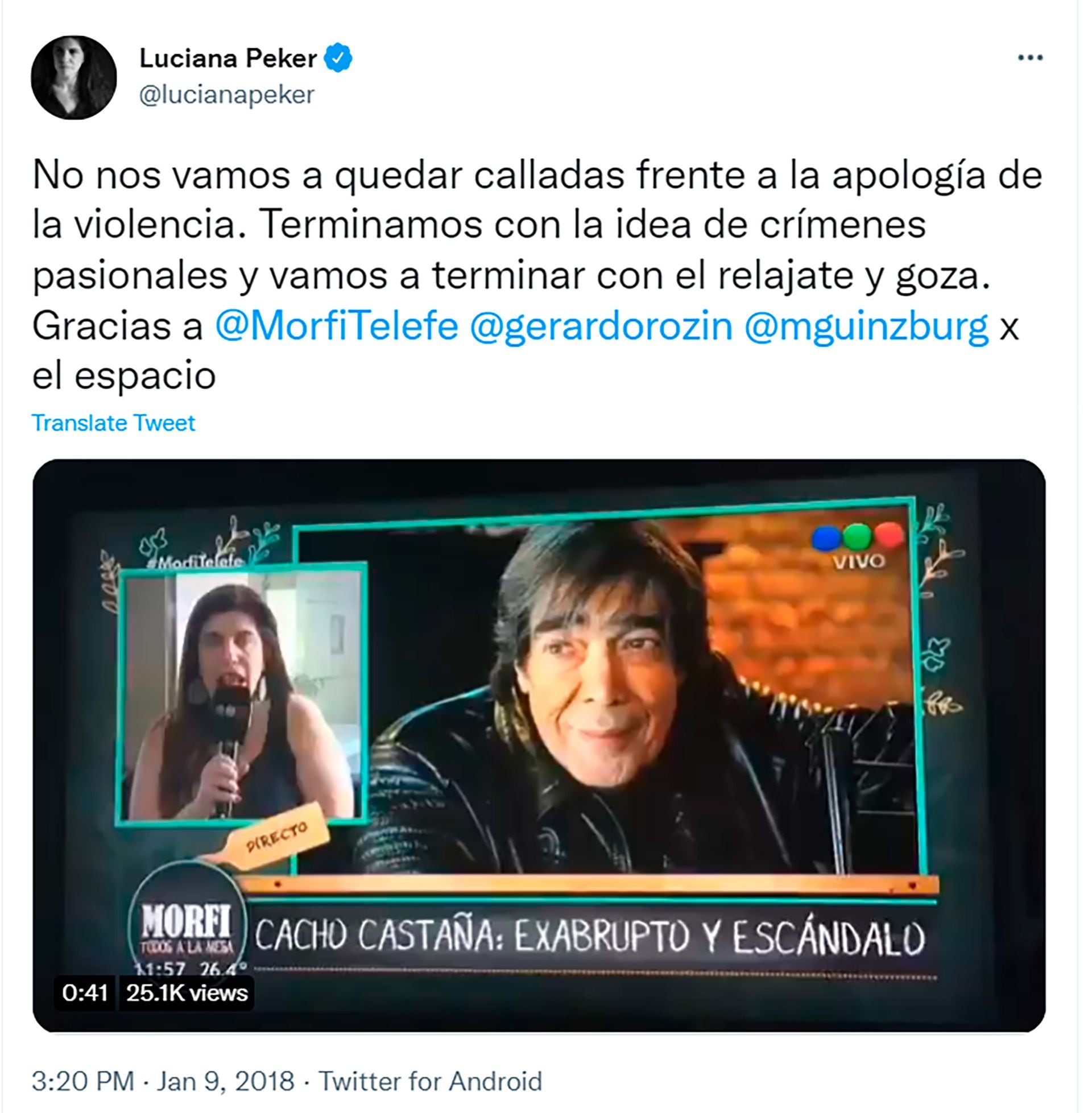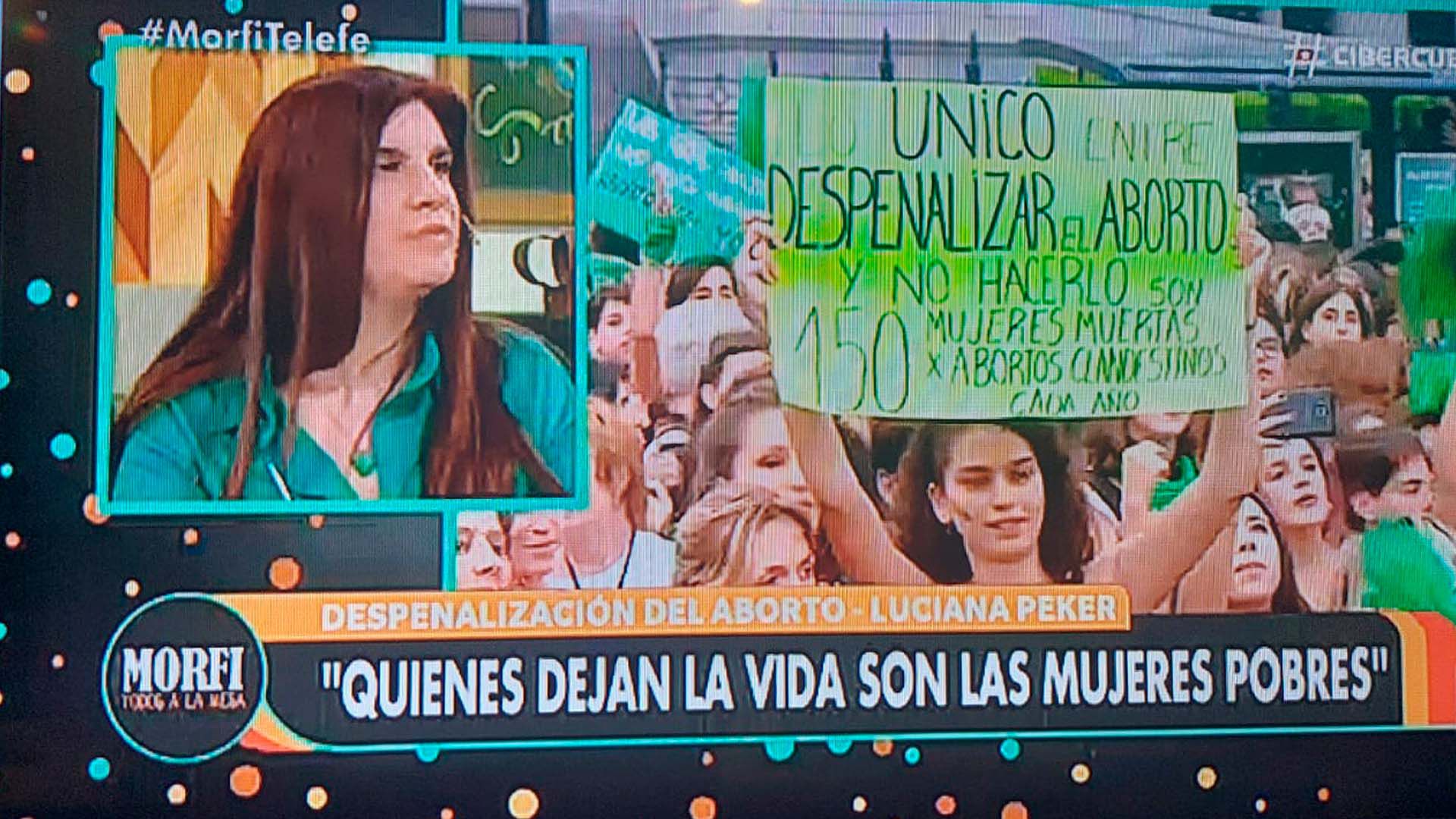
Men are often called by their surname. To women, on the other hand, by name. The surname gives seriousness and the name closeness. Gerardo Rozín, however, is Gerardo. Perhaps the balance between popularity, massiveness, people's affection, television times and a line of depth, reflection and culture that goes beyond rating, effect or viralization are a tribute to Gerardo (Gerardo or Rozín), but also a show that another television was possible.
And I hope others will keep trying. It is not easy to find searches, proposals and programs similar to those of Gerardo (that are no more copy than conduct) in a context where the mud splashes on almost all programs and splashes so much that nothing can be seen without the eyes burning because of the hatred they exude.
I met Gerardo in 2010. He produced “Mañaneras” with Karina Mazzocco, Paula Trapani and Carmela Bárbaro. I was doing one of the first genre columns on television on the now closed channel CN23. Today gender issues are more common on TV, but not as much progress was made as it seems. On the contrary, today the voices that defame have a screen and there is no genre column like the ones we knew how to build with Mariana Carbajal and Liliana Hendel.
Television has always played hide and seek with the women's movement in Argentina (not with some women on the loose, nor with women who take off their garments against other women), but with a movement that was able to generate a feminist revolution that is more recognized in the world than on our screen.
In 2015, a big hit was generated with the movement “Ni Una Menos” that television showed. But what he did as if he didn't exist to rethink the modes of audiovisual production. But the denunciations of the “Me Too” brought a wave of massive criticism and questioning.
Networks (which are already worse than television today even though we continue to watch TV and use Twitter) were a window of opportunity in the first boom of effect and repercussion. It was possible to impose an agenda that producers did not need to approve and, although there were discussions, call centers were not organized so that those of us who wrote weigh the dosage of bad blood by hematocrit on the scale before we saw what we wrote.

When television opened the door, there were changes. Because, despite us, television continues to carry a heavy weight of communication when it comes to producing social and political effects. Pepito Cibrián's reading of “Marica” on Susana Giménez's program was one of the factors (not the only one, there is never a single factor) that influenced the approval of marriage equality with a popular nod to love without lord and lady in the marriage book and the wedding cake.
In the approval of legal abortion, the summer opening of “Intruders” in which we paraded a series of feminists (Bimbo, Julia Mengolini, Malena Pichot, Flor Freijo, Ingrid Beck, Valeria Licciardi, among others) was a shock to bring abortion out of the closet and that we could talk, in every house, in broad daylight, of all the women who had terminated a pregnancy and did not say so. But if it was said on TV it was easier to say.
However, many drivers regretted opening the microphone to feminists. And it shows. There are excellent journalists and hosts on channels. But there are more changes for the gallery than real changes, there are no gender columns and journalists with more space and ratings seem to have anger against women and not work to do what in the Canadian series Workin' Moms call the “elevator” effect so that those who occupy places above help others (who are below) can also ascend. They seem to want to cut the rope rather than lift the other women up.

Gerardo contributed to the dissemination of humor, music and popular culture with a nobility that garnered a rating but was recognized exponentially after his death. Maybe because it's like a song that's not shrill and it shows more when it's turned off than when it's turned on. But it deserves to be recognized. And, in addition, Gerardo's work and humanity deserve that neither his memory nor his example be extinguished: a television with more dignity is possible.
Almost all comments about Gerardo value the same gesture: he knew how to listen. Personally, I felt the same way every time I talked to him: he knew how to listen. And he taught to listen to others and to listen to oneself in one's own desires. Also, in these last months of illness, Gerardo taught me to hear about death like no one else had. He wasn't just going to die, he knew he was going to die soon. It made the unbearable turn into laughter, pain or friendship. I thank you for that lesson in lifelong dignity.
Listening is that gesture that seems extinct among journalists, drivers and men on a motorcycle that makes so much noise that they don't get any more sound. Gerardo really heard that there is a need for a cultural change in relation to machismo. Many men said they were deconstructing or rebuilding. And that seemed like a good point. It was not necessary for them to have records of saints or unpolluted ones. But that they were able to listen (it wasn't that bad either). But for most it was a fashion, a pose or, on the contrary, a plant to become more macho.

I don't regret trying. Talk where they left me, try to get those who seemed willing to listen. To get further and deeper than we could do by writing in Las/12, from Page/12, a fact that Gerardo liked because he had started in his beloved Rosario/12. But in many cases it was a failure. With Gerardo, the success was not of a program, but of a sincere and transformative conversation in real life. And in illness and death - which are part of reality - too.
November 9, 2016 was the first time he invited me to his program. I came back with a pékele (a delicious chocolate, banana and dulce de leche cake from Chantal Abad) that he took care of getting wrapped around me (like someone who invites to a TV studio or to the living room of his house) and the gift made my daughter happy who accompanied me. It was no exception. Not the only invitation. We went with journalists Mariana Carbajal and Florencia Alcaraz after Donald Trum's triumph in the United States. And he, who was plural, and was very far from the crack where he didn't fit, wasn't neutral either. He didn't like machismo or racism. And so he said it.
That time, he said, in relation to Trump's election: “We want to try to understand why a sexist who is confessed and proud of how his economic power and for being famous could serve him to conquer a woman and advance physically as well,” he stressed before giving rise to the word.
But perhaps the words that most show a depth that must be rescued are what he editorialized saying that he was making an editorial pass (tell me which interviewee you are taking and I'll tell you what you mean) on January 9, 2018. A day earlier Hollywood had stood up against sexual abuse with the hashgat #Time's Up and actresses dressed in black in a scene that took #MeToo to the red carpet at the Golden Globe Awards.

But Argentina woke up with a controversy because Cacho Castaña had said “If women are raped, let them relax and enjoy themselves”. We are not going to say that the conductor who gave rise to folklore, tango, cumbia, trova and rock did not understand popular culture. However, he was encouraged to go one step further. “More than an interview we wanted to ask you for almost a publishing house, Luciana,” she gave me the pass to condemn the naturalization of sexual violence.
But he was not silent and stressed: “Culturally society understood that some content is too heavy for real life. And that validating some speeches ends up installing an idea of things about how the gender issue is handled in society that ends up facilitating action for the violent. I understand that it is enough, in the world, that culture makes things easier for the violent.”
On August 6, 2018, there were two days left for the Senate of the Nation to deal with the Voluntary Termination of Pregnancy. There was censorship on the channels, there were journalists closing the doors and there were women who only brought men to their table at decisive moments for the future of women. Gerardo was not on the air, but he decided, as a producer, to open the word again. In his city, Rosario, abortion was legal for reasons and he gave his screen to write in the graphs: “Those who leave life are poor women”; “Society has double standards” or “The pressures against young women are undemocratic”.
On December 13, 2018, after Thelma Fardín's denunciation, the microphone was open again on her program. And also to tell about the book “The revolution of the daughters”, with photos of the green scarves, which today are insulted from other places where the television game is not fair and women are being pushed back. There are times when comparisons are necessary. But, in this one, especially, to thank you and to show that you can reflect another television while remaining popular, familiar and in prime time.
Many drivers called me when they were criticized, questioned or burned on social media. Gerardo, too. But he was the only one who kept the conversation and microphone of his programs (as a conductor and producer, when he was on camera or behind the guest list) and the conductors were other faces: Alejandro Fantino, Zaira Nara, Damian De Santo, Paulo Kablan, Melina Fleiderman, Malena Guinzburg, etc.
The biggest problem is not to have some sexist gesture, but to be unable to hear that change is necessary. The greatest hypocrisy came from those who said they listened and at the first change they put plugs in their ears again. Gerardo also demonstrated that listening, changing and having a rating is possible. And that dignity is part of the cultural heritage that it leaves us. Let them listen to us.
Gerardo proposed doing a program with a feminist panel that we discussed in bars (among many more food comments, of course) and they didn't let it. But as someone who truly believes in television, he always kept the possibility of talking about sexual violence, female enjoyment, Trump's effect on politics and, in the midst of the pandemic, about another issue that worried him and who gave him screen: the fires that affected his beloved Rosario so much in 2021.
He always talked about his friends: Romina Manguel, Claudia Acuña, Gabriela Esquivada and Nidia Marsero. Of course, among many others. But he listened to women, laughed and advised. And he knew how to value and accompany the intelligent women who surrounded him.
He spoke with great pride about the mother of his daughter (Carmela Bárbaro) and the mother of his son (Mariana Basualdo) and felt a responsibility to accompany the mothers with whom he sat down in their struggles to review the co-responsibilities of parenting.
And he spoke, above all, of the importance for him to care, raise, laugh and accompany his daughter. And that his daughter would be proud of him. I want to write this tribute, to fulfill to him, that what mattered most to him was to fulfill her.
TO CONTINUE READING
Últimas Noticias
Debanhi Escobar: they secured the motel where she was found lifeless in a cistern

The oldest person in the world died at the age of 119

Macabre find in CDMX: they left a body bagged and tied in a taxi
The eagles of America will face Manchester City in a duel of legends. Here are the details

Why is it good to bring dogs out to know the world when they are puppies



